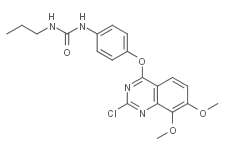
KRN-633
CAS No. 286370-15-8
KRN-633( KRN633 | KRN-633 | KRN 633 )
Catalog No. M18365 CAS No. 286370-15-8
KRN-633 is an effective VEGFR inhibitor. The IC50s of KRN-633 for VEGFR1, VEGFR2, and VEGFR3 is 170, 160 and 125 nM, respectively.
Purity : >98% (HPLC)
 COA
COA
 Datasheet
Datasheet
 HNMR
HNMR
 HPLC
HPLC
 MSDS
MSDS
 Handing Instructions
Handing Instructions
| Size | Price / USD | Stock | Quantity |
| 2MG | 53 | In Stock |


|
| 5MG | 86 | In Stock |


|
| 10MG | 138 | In Stock |


|
| 25MG | 228 | In Stock |


|
| 50MG | 332 | In Stock |


|
| 100MG | 494 | In Stock |


|
| 500MG | 1071 | In Stock |


|
| 1G | Get Quote | In Stock |


|
Biological Information
-
Product NameKRN-633
-
NoteResearch use only, not for human use.
-
Brief DescriptionKRN-633 is an effective VEGFR inhibitor. The IC50s of KRN-633 for VEGFR1, VEGFR2, and VEGFR3 is 170, 160 and 125 nM, respectively.
-
DescriptionKRN633 is a potent and selective VEGFR inhibitor. which inhibits tyrosine phosphorylation of VEGFR-2 (IC50 = 1.16 nmol/L) in human umbilical vein endothelial cells. Selectivity profiling with recombinant tyrosine kinases showed that KRN633 is highly selective for VEGFR-1, -2, and -3. KRN633 inhibits tumor growth in several in vivo tumor xenograft models with diverse tissue origins, including lung, colon, and prostate, in athymic mice and rats. KRN633 also causes the regression of some well-established tumors and those that had regrown after the cessation of treatment. KRN633 was well tolerated and had no significant effects on body weight or the general health of the animals. KRN633 might be useful in the treatment of solid tumors and other diseases that depend on pathologic angiogenesis. (In Vitro):KRN-633 inhibits tyrosine phosphorylation of VEGFR-1, VEGFR2, c-Kit, and PDGFR-β (IC50=11.7, 1.16, 8.01, 130 nM) in human umbilical vein endothelial cells. KRN-633 also inhibits the VEGF-driven proliferation of HUVECs (IC50=14.9 nM). KRN-633 suppresses capillary tube formation of endothelial cells.(In Vivo):KRN-633 inhibits tumor growth in several tumor xenograft models with diverse tissue origins, including lung, colon, and prostate, in athymic mice and rats. KRN-633 also causes the regression of some well-established tumors and those that have regrown after the cessation of treatment. KRN-633 is well tolerated and has no significant effects on body weight or the general health of the animals. Histologic analysis of tumor xenografts treated with KRN-633 reveals a reduction in the number of endothelial cells in non-necrotic areas and a decrease in vascular permeability.
-
In VitroKRN-633 inhibits tyrosine phosphorylation of VEGFR-1, VEGFR2, c-Kit, and PDGFR-β (IC50=11.7, 1.16, 8.01, 130 nM) in human umbilical vein endothelial cells. KRN-633 also inhibits the VEGF-driven proliferation of HUVECs (IC50=14.9 nM). KRN-633 suppresses capillary tube formation of endothelial cells.
-
In VivoKRN-633 inhibits tumor growth in several tumor xenograft models with diverse tissue origins, including lung, colon, and prostate, in athymic mice and rats. KRN-633 also causes the regression of some well-established tumors and those that have regrown after the cessation of treatment. KRN-633 is well tolerated and has no significant effects on body weight or the general health of the animals. Histologic analysis of tumor xenografts treated with KRN-633 reveals a reduction in the number of endothelial cells in non-necrotic areas and a decrease in vascular permeability.
-
SynonymsKRN633 | KRN-633 | KRN 633
-
PathwayOthers
-
TargetOther Targets
-
RecptorVEGFR1|VEGFR2|VEGFR3
-
Research AreaCancer
-
Indication——
Chemical Information
-
CAS Number286370-15-8
-
Formula Weight416.86
-
Molecular FormulaC20H21ClN4O4
-
Purity>98% (HPLC)
-
SolubilityDMSO : ≥ 8 mg/mL; 19.19 mM
-
SMILESCCCNC(=O)Nc1ccc(Oc2ncnc3cc(OC)c(OC)cc23)cc1Cl
-
Chemical Name1-(2-chloro-4-(6,7-dimethoxyquinazolin-4-yloxy)phenyl)-3-propylurea
Shipping & Storage Information
-
Storage(-20℃)
-
ShippingWith Ice Pack
-
Stability≥ 2 years
Reference
1.Nakamura K, et al. KRN633: A selective inhibitor of vascular endothelial growth factor receptor-2 tyrosine kinase that suppresses tumor angiogenesis and growth. Mol Cancer Ther. 2004 Dec;3(12):1639-49.
molnova catalog



related products
-
Lecithin
Lecithin is regarded as a safe, conventional phospholipid source.
-
UCPH-101
UCPH-101 is an?inhibitor of excitatory amino acid transporter subtype 1?(EAAT1) with an?IC50?of 0.66 μM.
-
Experimental Autoimm...
Experimental Autoimmune Encephalomyelitis Complementary Peptide



 Cart
Cart
 sales@molnova.com
sales@molnova.com


